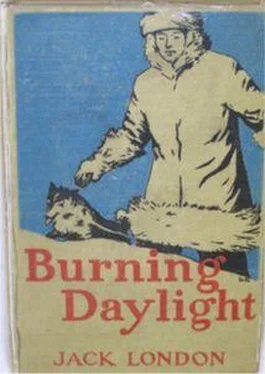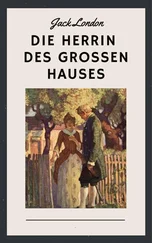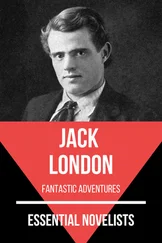Jack London - Burning Daylight
Здесь есть возможность читать онлайн «Jack London - Burning Daylight» весь текст электронной книги совершенно бесплатно (целиком полную версию без сокращений). В некоторых случаях можно слушать аудио, скачать через торрент в формате fb2 и присутствует краткое содержание. Год выпуска: 1910, Жанр: Классическая проза, Природа и животные, Путешествия и география, на английском языке. Описание произведения, (предисловие) а так же отзывы посетителей доступны на портале библиотеки ЛибКат.
- Название:Burning Daylight
- Автор:
- Жанр:
- Год:1910
- ISBN:нет данных
- Рейтинг книги:5 / 5. Голосов: 1
-
Избранное:Добавить в избранное
- Отзывы:
-
Ваша оценка:
- 100
- 1
- 2
- 3
- 4
- 5
Burning Daylight: краткое содержание, описание и аннотация
Предлагаем к чтению аннотацию, описание, краткое содержание или предисловие (зависит от того, что написал сам автор книги «Burning Daylight»). Если вы не нашли необходимую информацию о книге — напишите в комментариях, мы постараемся отыскать её.
Burning Daylight — читать онлайн бесплатно полную книгу (весь текст) целиком
Ниже представлен текст книги, разбитый по страницам. Система сохранения места последней прочитанной страницы, позволяет с удобством читать онлайн бесплатно книгу «Burning Daylight», без необходимости каждый раз заново искать на чём Вы остановились. Поставьте закладку, и сможете в любой момент перейти на страницу, на которой закончили чтение.
Интервал:
Закладка:
"That's an average of over thirty-three miles a day," Doc Watson warned, "and I've travelled some myself. A blizzard on Chilcoot would tie him up for a week."
"Yep," Bettles retorted, "an' Daylight'll do the second thousand back again on end in thirty days more, and I got five hundred dollars that says so, and damn the blizzards."
To emphasize his remarks, he pulled out a gold-sack the size of a bologna sausage and thumped it down on the bar. Doc Watson thumped his own sack alongside.
"Hold on!" Daylight cried. "Bettles's right, and I want in on this. I bet five hundred that sixty days from now I pull up at the Tivoli door with the Dyea mail."
A sceptical roar went up, and a dozen men pulled out their sacks.
Jack Kearns crowded in close and caught Daylight's attention.
"I take you, Daylight," he cried. "Two to one you don't—not in seventy-five days."
"No charity, Jack," was the reply. "The bettin's even, and the time is sixty days."
"Seventy-five days, and two to one you don't," Kearns insisted. "Fifty Mile'll be wide open and the rim-ice rotten."
"What you win from me is yours," Daylight went on. "And, by thunder, Jack, you can't give it back that way. I won't bet with you. You're trying to give me money. But I tell you-all one thing, Jack, I got another hunch. I'm goin' to win it back some one of these days. You-all just wait till the big strike up river. Then you and me'll take the roof off and sit in a game that'll be full man's size. Is it a go?"
They shook hands.
"Of course he'll make it," Kearns whispered in Bettles' ear. "And there's five hundred Daylight's back in sixty days," he added aloud.
Billy Rawlins closed with the wager, and Bettles hugged Kearns ecstatically.
"By Yupiter, I ban take that bet," Olaf Henderson said, dragging Daylight away from Bettles and Kearns.
"Winner pays!" Daylight shouted, closing the wager.
"And I'm sure going to win, and sixty days is a long time between drinks, so I pay now. Name your brand, you hoochinoos! Name your brand!"
Bettles, a glass of whiskey in hand, climbed back on his chair, and swaying back and forth, sang the one song he knew:—
"O, it's Henry Ward Beecher
And Sunday-school teachers
All sing of the sassafras-root;
But you bet all the same,
If it had its right name
It's the juice of the forbidden fruit."
The crowd roared out the chorus:—
"But you bet all the same
If it had its right name
It's the juice of the forbidden fruit."
Somebody opened the outer door. A vague gray light filtered in.
"Burning daylight, burning daylight," some one called warningly.
Daylight paused for nothing, heading for the door and pulling down his ear-flaps. Kama stood outside by the sled, a long, narrow affair, sixteen inches wide and seven and a half feet in length, its slatted bottom raised six inches above the steel-shod runners. On it, lashed with thongs of moose-hide, were the light canvas bags that contained the mail, and the food and gear for dogs and men. In front of it, in a single line, lay curled five frost-rimed dogs. They were huskies, matched in size and color, all unusually large and all gray. From their cruel jaws to their bushy tails they were as like as peas in their likeness to timber-wolves. Wolves they were, domesticated, it was true, but wolves in appearance and in all their characteristics. On top the sled load, thrust under the lashings and ready for immediate use, were two pairs of snowshoes.
Bettles pointed to a robe of Arctic hare skins, the end of which showed in the mouth of a bag.
"That's his bed," he said. "Six pounds of rabbit skins. Warmest thing he ever slept under, but I'm damned if it could keep me warm, and I can go some myself. Daylight's a hell-fire furnace, that's what he is."
"I'd hate to be that Indian," Doc Watson remarked.
"He'll kill'm, he'll kill'm sure," Bettles chanted exultantly. "I know. I've ben with Daylight on trail. That man ain't never ben tired in his life. Don't know what it means. I seen him travel all day with wet socks at forty-five below. There ain't another man living can do that."
While this talk went on, Daylight was saying good-by to those that clustered around him. The Virgin wanted to kiss him, and, fuddled slightly though he was with the whiskey, he saw his way out without compromising with the apron-string. He kissed the Virgin, but he kissed the other three women with equal partiality. He pulled on his long mittens, roused the dogs to their feet, and took his Place at the gee-pole. [4] A gee-pole: stout pole projecting forward from one side of the front end of the sled, by which the sled is steered.
"Mush, you beauties!" he cried.
The animals threw their weights against their breastbands on the instant, crouching low to the snow, and digging in their claws. They whined eagerly, and before the sled had gone half a dozen lengths both Daylight and Kama (in the rear) were running to keep up. And so, running, man and dogs dipped over the bank and down to the frozen bed of the Yukon, and in the gray light were gone.
CHAPTER IV
On the river, where was a packed trail and where snowshoes were unnecessary, the dogs averaged six miles an hour. To keep up with them, the two men were compelled to run. Daylight and Kama relieved each other regularly at the gee-pole, for here was the hard work of steering the flying sled and of keeping in advance of it. The man relieved dropped behind the sled, occasionally leaping upon it and resting.
It was severe work, but of the sort that was exhilarating.
They were flying, getting over the ground, making the most of the packed trail. Later on they would come to the unbroken trail, where three miles an hour would constitute good going. Then there would be no riding and resting, and no running. Then the gee-pole would be the easier task, and a man would come back to it to rest after having completed his spell to the fore, breaking trail with the snowshoes for the dogs. Such work was far from exhilarating also, they must expect places where for miles at a time they must toil over chaotic ice-jams, where they would be fortunate if they made two miles an hour. And there would be the inevitable bad jams, short ones, it was true, but so bad that a mile an hour would require terrific effort. Kama and Daylight did not talk. In the nature of the work they could not, nor in their own natures were they given to talking while they worked. At rare intervals, when necessary, they addressed each other in monosyllables, Kama, for the most part, contenting himself with grunts. Occasionally a dog whined or snarled, but in the main the team kept silent. Only could be heard the sharp, jarring grate of the steel runners over the hard surface and the creak of the straining sled.
As if through a wall, Daylight had passed from the hum and roar of the Tivoli into another world—a world of silence and immobility. Nothing stirred. The Yukon slept under a coat of ice three feet thick. No breath of wind blew. Nor did the sap move in the hearts of the spruce trees that forested the river banks on either hand. The trees, burdened with the last infinitesimal pennyweight of snow their branches could hold, stood in absolute petrifaction. The slightest tremor would have dislodged the snow, and no snow was dislodged. The sled was the one point of life and motion in the midst of the solemn quietude, and the harsh churn of its runners but emphasized the silence through which it moved.
It was a dead world, and furthermore, a gray world. The weather was sharp and clear; there was no moisture in the atmosphere, no fog nor haze; yet the sky was a gray pall. The reason for this was that, though there was no cloud in the sky to dim the brightness of day, there was no sun to give brightness. Far to the south the sun climbed steadily to meridian, but between it and the frozen Yukon intervened the bulge of the earth. The Yukon lay in a night shadow, and the day itself was in reality a long twilight-light. At a quarter before twelve, where a wide bend of the river gave a long vista south, the sun showed its upper rim above the sky-line. But it did not rise perpendicularly. Instead, it rose on a slant, so that by high noon it had barely lifted its lower rim clear of the horizon. It was a dim, wan sun. There was no heat to its rays, and a man could gaze squarely into the full orb of it without hurt to his eyes. No sooner had it reached meridian than it began its slant back beneath the horizon, and at quarter past twelve the earth threw its shadow again over the land.
Читать дальшеИнтервал:
Закладка:
Похожие книги на «Burning Daylight»
Представляем Вашему вниманию похожие книги на «Burning Daylight» списком для выбора. Мы отобрали схожую по названию и смыслу литературу в надежде предоставить читателям больше вариантов отыскать новые, интересные, ещё непрочитанные произведения.
Обсуждение, отзывы о книге «Burning Daylight» и просто собственные мнения читателей. Оставьте ваши комментарии, напишите, что Вы думаете о произведении, его смысле или главных героях. Укажите что конкретно понравилось, а что нет, и почему Вы так считаете.












